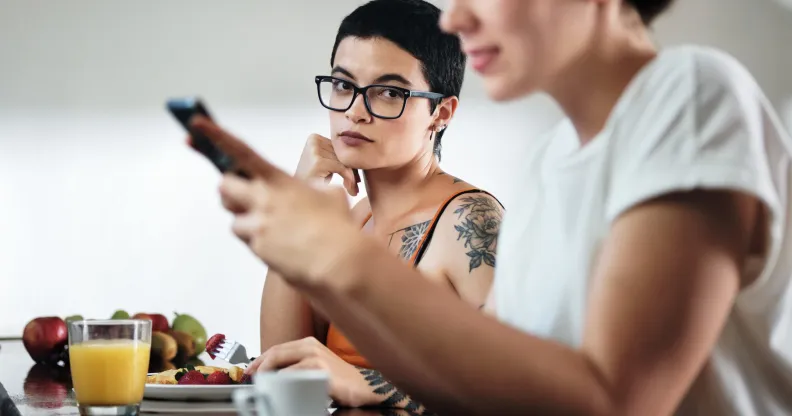New study explains how ‘double stigma’ takes its toll on bisexual women

Young woman being ignored by her girlfriend and feeling jealous. (Envato/Stock photo)
Bisexual women have a hard time.
Whether it’s pop stars repeating tired and harmful stereotypes about them or TV shows forgetting they exist, bisexual people – and women especially – can experience poor mental health due to biphobia, invisibility and erasure.
Like lesbian and gay people, bisexuals face discrimination and stigmatisation from non-LGBT+ people for not being straight.
But bisexual people also face discrimination and stigma from within the LGBT+ community – and this is worse for bi women, a study has found.
Published in the journal Psychology of Sexual Orientation and Gender Diversity, the study looked at prejudice against bisexual people from lesbians and gays, with a particular focus on how bisexual people’s gender and sexual orientation are perceived.
The researcher vouched for what bisexual people know to be true: lesbians and gays perceive bisexual people to be more attracted to men, meaning that bisexual women are perceived as straight and bisexual men as gay.
Calling this the androcentric desire hypothesis, the researchers went on to examine how this plays into two stereotypes – bisexual men being perceived as closeted gays, and bi women being perceived as straight women experimenting.
For the research, 165 lesbians and gay men were asked to answer questions about bisexual people.
Both lesbians and gay men perceived bisexual men to be more attracted to men than women, but while gay men thought bi women were attracted to men and women roughly equally, lesbians thought that bi women were much more attracted to men.
This helps explain what underpins lesbian prejudice against bi women, with (thankfully no longer commonplace) phrases like “gold star lesbian” – meaning a woman who’s never had sex with a man – showing how deep-rooted this prejudice is.
The androcentric desire hypothesis shows us how bisexual women fare the worst of all groups within the LGB range of sexualities, because whereas bisexual men’s sexuality is seen as more “authentically” gay (because of their perceived stronger attraction to men), bisexual women’s sexuality is seen as “fake” (because of their perceived stronger attraction to men).
While the study had a small sample size, it helps offer clarity on the prejudice experienced by bi women within LGBT+ communities.

